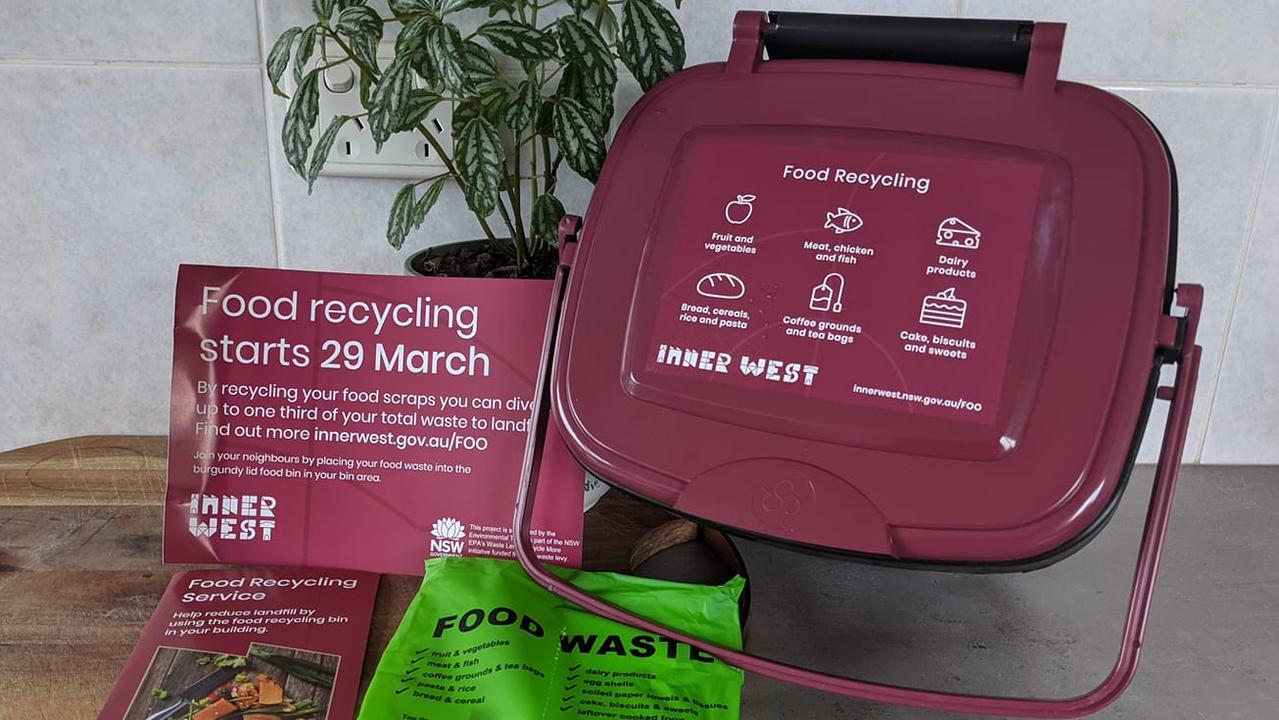Inner West Council’s tiny bins make big bid to reduce food waste
Residents in one Sydney council have been given this small bin for their kitchen bench. And it’s had a huge impact already.
The food recycling program launched by Sydney’s Inner West Council has saved more than 713 tonnes of food waste from going to landfill.
To put that into perspective, it’s prevented the equivalent emissions of removing 433 cars from roads.
The free initiative, which was designed to make composting more accessible to apartment dwellers, began in 2016 in the now non-existent Leichhardt Council (which has since been amalgamated into the Inner West Council).
At the time it was the first program of its kind. But now it covers over 22,000 units in 1100-plus apartment buildings.
Residents in the Inner West are given a free kitchen counter caddy, which they then empty into a kerb-side bin which is picked up and processed by the council.
For Ashfield resident Jessica Rozema, 39, this program gave her the opportunity to sustainably dispose of her food scraps – something which she wasn’t previously able to do because she lived in an apartment block.

She’s been a big fan of the initiative ever since she unexpectedly found out her apartment block was part of the program.
“We used to get super frustrated that we had to throw out food all day because we can’t have a composting strategy due to our strata and I hate wasting food,” she told news.com.au.
“We put out pretty much all of our food scraps from peeling vegetables and leftover foods. There’s two of us here and we eat quite different foods and I hate wasting our leftovers.”
An unexpected effect of the bins is also the fact that Ms Rozema has reduced the amount of waste that goes into her general waste bin.
“Our bin isn’t smelly and gross all the time either, because the food scraps are separate,” she said. “Our waste is cleaner.”
The only gripe Ms Rozema has with the bins is that supplied liners “break down super quickly”. As the liners are also recycled with the food waste, it’s a rule residents only use Australian certified (AS4736) compostable bin liners to collect food.
“The liners dissolve quite quickly and for us we’re on the third floor of an apartment floor. It’s really not a problem because I take it out every two days so it doesn’t get smelly,” she said.
“But apart from that, it’s great.”
Program eliminates huge amount of waste
The initiative was introduced after it was revealed that food waste makes up to 35 per cent of the average bin. Conversely the excess garbage also contributes to 8 per cent of total greenhouse gas emissions.
Since being implemented to households, a spokeswoman for the council said “participation in the service has been high with low, almost negligible, contamination rates”. NSW’s recent spate of Covid restrictions also saw recycling increase to “around 16 tonnes per week,” she said.
The food recycling program is part of Inner West Council’s strategy to eliminate the 79.5 per cent of waste generated by residents through strategies like reducing landfill and increasing repair and reuse opportunities to lower over-consumption.
“Food waste makes up 35 per cent of waste in the average bin,” councillor Darcy Byrne said. “It is unnecessarily filling up our landfill sites and contributing 8 per cent to our total greenhouse gas emissions.
“We want to lead the nation in eliminating organic waste. This announcement is the latest stage in the complete overhaul of our domestic waste services.”
“We are also continuing in the campaign to see a single food recycling service adopted across broader Sydney, as we want every household to have access to the scheme ASAP.”
The food recycling services will eventually be integrated into a Food Organics and Garden Organics (FOGO) service, which wasn’t available when the original program began, said a council spokeswoman.
The waste processing system, which is available in select councils across most Australian states and territories, allows residents to place food waste and garden waste in the green bin which is then recycled into compost.
Eight months on from receiving her bin, Ms Rozema said she wishes more people in her apartment complex would also use the program.
“Sadly, I think most people in our apartment building are just too lazy to use it,” she said.
“It doesn’t make for any more extra work but it makes such a difference to the planet. I can’t see why anyone would have a problem with it.”






